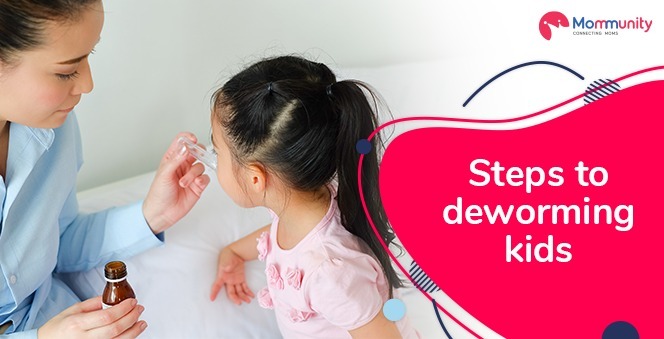As soon as you notice symptoms of intestinal worms in your kid Deworming is the first step you should take. There are many ways to deworm your kid. However, the treatment is different for different types of infestation your kid is suffering from. You may expel these intestinal worms through prescribed medicine for older kids or make use of syrup, in the case of toddlers, as recommended by your doctor. Healthy Little Explorers: Empowering Children Through Deworming
WHAT ARE INTESTINAL WORMS?
Intestinal worms are parasitic worms such as tapeworms, roundworms, pinworms, and hookworms, which fester in the intestinal walls of humans and animals and lead to larger health issues if left untreated. Unhygienic and unsanitary surroundings and consumption of contaminated water or food are some common causes of intestinal worm infestation in the human body. Early diagnosis can help you identify the type of worms your kid is infected with so that you can easily treat your kid with the help of Deworming medication prescribed by your doctor.
WHAT IS DEWORMING?
DDeworming kids is the procedure of throwing out intestinal worms or parasitic worms from the body by using an anthelmintic medicine/drug. In other words, it is a medicated process of getting rid of intestinal worms by the usage of anthelmintic medication.
HOW DO KIDS GET WORMS?
There are several causes of worms in children. Some of the common ways through which kids can fall prey to parasitic worms are:
- Drinking contaminated water can cause an infestation of worms in your kids.
- Poor hygiene is another way these worms can enter your body.
- Eating undercooked meat from an infected animal or undercooked fruits and vegetables infected with worms.
- Kids while playing in the soil infested with worms could also cause an infestation in your kid.
- Infected pets can also become the messenger of parasitic worms and travel easily from your pets to your kid.
- Inadequate sanitation is one of the causes of parasitic worms, especially for those who do not wash their hands after using the toilet.
- Intestinal worms breed in an unhygienic environment. Usually, the kids end up getting worm eggs on their hands while playing with worm-infested toys or playing in the dirt, which travels into their bodies if they touch their mouths or eat something without washing their dirty hands.
SYMPTOMS OF WORMS IN CHILDREN
Here are a few symptoms that can help you identify if your kid has fallen prey to intestinal worms or not:
- Abdominal pain
- Redness or rash on the buttocks
- Weight loss
- Appetite loss
- Anemia can be related to parasitic worms
- Tiredness, weakness, or hunger due to worms
- Blood in the stool
- Diarrhea or constipation
- Urinating frequently
- Pain while urinating
- The child feels tired and weak
DIAGNOSING WORMS
Consult your doctor immediately if you suspect an infestation of worms in your child based on any of the above symptoms and get your child diagnosed as soon as possible. There are many ways of diagnosing worms in children, such as taking samples of stool to examine the presence of worms or taking a blood sample to examine the presence of antibodies, usually produced when attacked by parasites. Some of the common methods of diagnosing worms in children:
1. Checking Fingernails- As your hands are the earliest mode of transferring worms inside the body through ingestion, worms often leave their eggs under the fingernails.
2. Sticky Tape Test- The doctor uses sticky tape and sticks it to the child’s bottom. The tape will then be removed and sent to the lab to test for worm eggs stuck to the tape.
3. Stool Examination- The stool is examined to check for worms. If positive, it indicates that there are worms in the intestines.
4. Ultrasound- The doctor may conduct an ultrasound in case the worm infestation is suspected to be severe.
DANGERS OF WORM INFECTIONS
People with low immunity, especially children, are more at risk for the infestation of intestinal worms. There are numerous dangers of worm infection one should be careful of. Some of the risks resulting from worm infections are malnutrition, intestinal blockage, a hindrance to the healthy growth of children, weight loss, and anemia.
HOW TO Deworming KIDS?
Parasitic worms lay eggs inside their host’s body and keep multiplying if left untreated for long; it could also make it even more difficult and time-consuming to deworm. Treatment against parasitic worms depends on the type of worms and symptoms your kid has. If you follow a healthy diet and have a strong immune system you can get rid of worms like tapeworms as they die on their own. However, you should always consult your doctor and follow an anthelmintic treatment prescribed by the doctor.
HOME REMEDIES FOR DEWORMING KIDS
Set a nutritious, balanced diet for your kid, which includes fruits and vegetables regularly.
The diet should include ginger and garlic.
Should completely avoid unhygienic food and water, especially from outside.
HOW CAN YOU PREVENT YOUR KIDS FROM GETTING WORMS?
Prevention is always better than cure. There are many ways in which your kid can get infected by intestinal worms such as playing in infested dirt, grass, and sand, eating food from unhygienic places, or coming in contact with already-infested people. Here are a few points to remember for prevention against worms:
Ensure that your kids wash their hands properly with soap before consuming anything.
Wash fruits or vegetables properly before eating, and also ensure that you eat nothing that is infested with worms.
Do not let your kids play barefoot in the mud, sand, grass, or other outdoor places.
Do not let your kids eat uncooked meat, especially pork, and fish, which are known to carry worms in them. Ensure that any swimming pool your child visits has cleared the hygienic standards.
Always drink purified water. Refrain from drinking water in public places.
Every parent should follow deworming kids as a precaution, since kids often play in mud and dirt outdoors, so it is likely they may come in contact with worm eggs. Since prevention is better than treatment, you should take the necessary steps to prevent your kids from coming in contact with these parasites, as much as possible, as well as follow a proper deworming routine every six months. Healthy Little Explorers: Empowering Children Through Deworming




